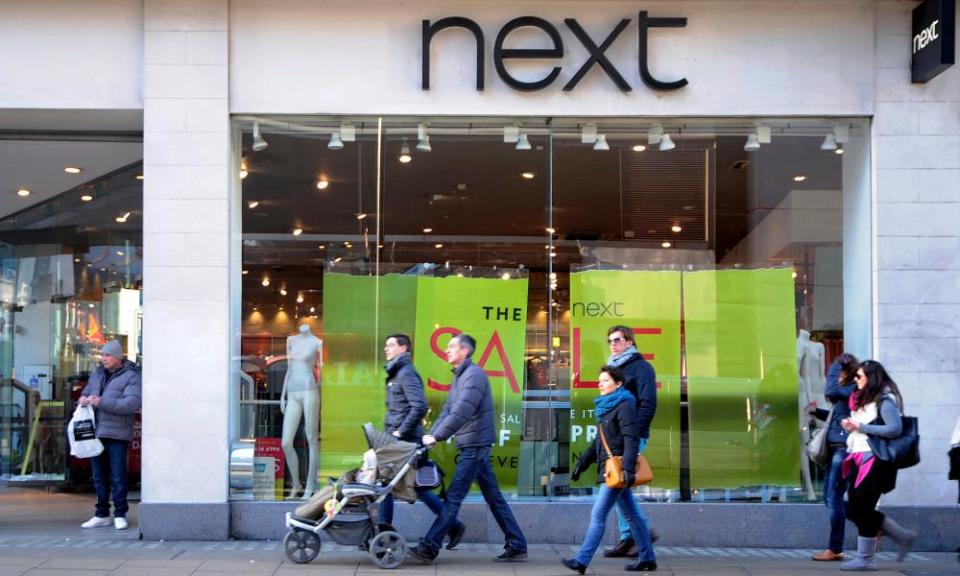What next for Next? Decline, if it comes, should still be profitable | Nils Pratley

Panic over for Next shareholders? It’s too soon to sound the all-clear since a steeper decline in profits than last year’s 4% fall to £790m is very possible this time. Chief executive Lord Wolfson also has a longer list of grumbles than usual: inflation, currencies, the squeeze on real incomes and consumers’ new love of entertainment over “stuff”.
For the time being, he won’t risk a penny of shareholders’ funds on share buy-backs in case the retailing weather turns nastier.
Yet, after a near-halving in Next’s stock market value over the past 16 months, there’s a fair argument that the gloom is in the price.
Some of Next’s woes were self-inflicted last year, which ought to make them easier to address. It concentrated on sharper fashion ranges and fell short on “easy to wear styles” – or school uniforms for the office, as outsiders unkindly describe them. Fixing the error doesn’t look too hard.
The factor that has really driven the steep fall in the share price is the suspicion that Next’s troubles run deeper than a temporary shortage of the right blouses. Too many shops for the age of internet shopping? Too much reliance on cheap credit to supercharge Directory, Next’s own online business?
Wolfson tackled both worries persuasively. On the property front, he offered a “portfolio stress test,” asking what would happen if like-for-like sales in the shops continue to fall for another 10 years.
In a truly bleak decade – defined as minus 6% every year – profit margins in the branches would halve but would still be 10% before counting central overheads.
That is because Next would close unprofitable stores when their leases expire and could reasonably expect to renew leases on profitable stores at lower rents. There would be decline, but it would be profitable decline that generates cash.
The complaint that Directory is addicted to customers who only buy on credit is starting to look overdone. Credit account customers are still the majority but their number fell 3% last year; cash customers increased 14%.
Add it all up and Next’s current troubles don’t look severe, assuming it remembers who its customers are. This is still a business that expects to generate surplus cash this year of £300m after capital expenditure and after paying an ordinary dividend that offers a yield of 3.7%.
If one takes a long view, crises of confidence in Next arrive about once a decade.
Wolfson pointed out that the share price fell 33% in 1997-98 and plunged 50% in 2007-08, and each time rebounded to achieve new highs. One suspects recovery will be slower this time but, yes, you’d bet on Next making it to the 2020s in reasonable shape.
In the meantime, Wolfson’s property stress test ought to be widely adopted. The supermarkets whoop excitedly about their growth in online sales but are shockingly shy about like-for-like sales trends in their big sheds. A Next-style analysis might be revealing.
Huge defeat counts for nothing
A 58% defeat for a remuneration report counts as a thumper, but Crest Nicholson cannot be surprised it happened. The housebuilder, based in the south-east, increased its pre-tax profits by 27% last year but the hurdle for directors to earn maximum jackpots will be set lower in future. Indeed, much lower: 8% growth per share will do for 2017-19 and, note, that’s a cumulative figure.
Naturally, the pay committee offered excuses for its generosity: Crest Nicholson has just enjoyed a period of exceptional profit growth; the pace can’t be sustained; and executives will also be shooting at targets for returns on capital.
OK, but tell it to the shareholders. Standard Life, the second largest, says it wasn’t consulted on the lower targets.
But here is the absurdity of that 58% against: nothing will happen as a result. Crest Nicholson will not alter the incentive target and is not obliged to do so because the vote was merely advisory.
The separate binding vote, on the forward-looking policy, was bizarrely passed overwhelming. Nor will Jim Pettigrew, chair of the remuneration committee, be resigning in embarrassment.
Why should he? He was simultaneously re-elected to the board with a 99% majority despite overseeing an incentive scheme that is supposedly far too lax.
Crest Nicholson illustrates perfectly the silliness of the current system for voting on remuneration. Shareholders tend to rebel only when the votes are advisory, and giving a thumbs-down to an individual director is still seen as not the done thing.
There are honourable exceptions, of course, but do not expect a revolution if the government legislates to make all votes on pay binding. Most fund managers prefer symbolic revolts to the real thing.

 Yahoo Finance
Yahoo Finance 